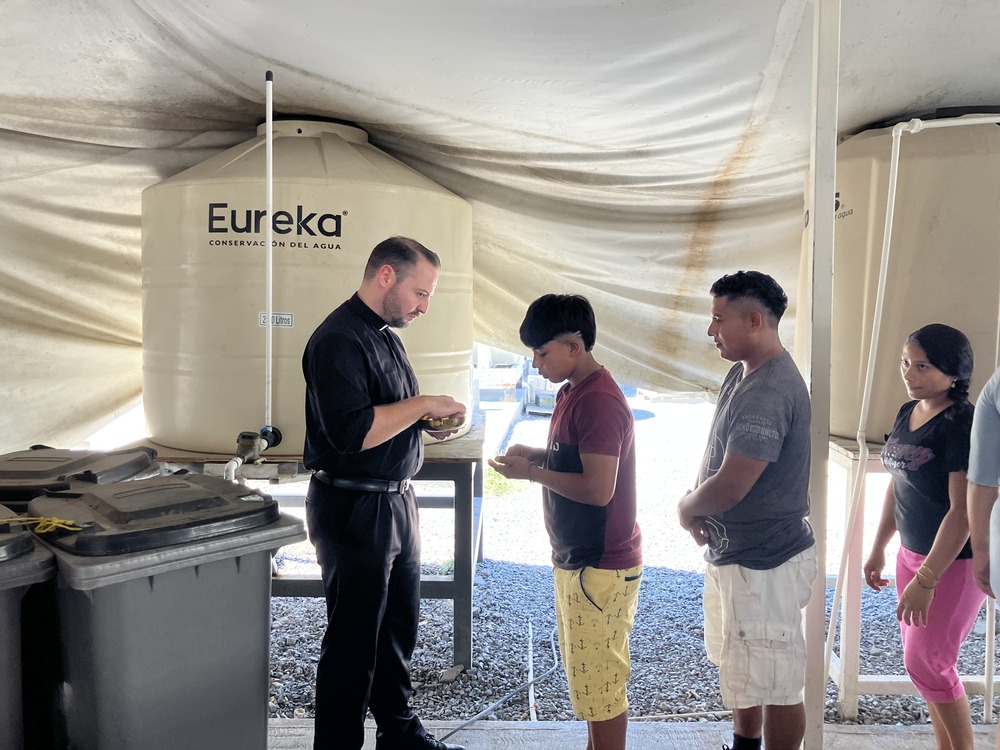
Jesuit scholastic Joseph Nolla distributes Communion during Mass celebrated Oct. 15, 2024, at the Senda de Vida migrant shelter in Reynosa, Mexico. (OSV News/David Agren)
Reynaldo Ceron received an unexpected surprise on Nov. 6, the day after the U.S. election.
The migrant from El Salvador, who confessed experiencing preelection "anxiety," nabbed an appointment through a smartphone app for entering the United States on Nov. 20 — exactly two months prior to the inauguration of the winner of the U.S. election, President-elect Donald Trump.
"It's been hard, but thanks to God it happened," Ceron, 45, told OSV News via WhatsApp from a shelter in Reynosa, Mexico, just south of McAllen, Texas. He plans to join his family residing in the Dallas area, but admits some trepidation despite having permission to enter the United States. "It's natural to be concerned by Trump's win," he said.
Migrants in Mexico waiting for appointments via the CBP One smartphone app — operated by U.S. Customs and Border Protection — face uncertain futures after the U.S. election. Trump has promised mass deportations, a reinforcement of border security and a reimplementation of the "Remain in Mexico" program, which kept migrants in Mexico as their asylum claims were heard in U.S. courts.
He also has nominated hard-liners for top border-security and immigration positions and could discontinue the CBP One app – which he derided as "phone app for smuggling" migrants.
The looming U.S. election and Trump's possible return to power had already prompted a sense of urgency among migrants, who hoped to reach the United States prior to the inauguration.
"They want to enter prior to Trump taking office," Dominican Brother Obed Cuellar told OSV News. He's the director of the diocesean migrant shelter in Piedras Negras, opposite Eagle Pass, Texas.
Trump's victory has triggered deep preoccupation among migrant populations in Mexico, who were left wondering what comes next.
"There were a lot of questions about what's going to happen after Jan 20," Jesuit Father Brian Strassburger told OSV News after a Nov. 12 visit to a pair of migrant shelters in Reynosa.
"I asked people how they were feeling with the elections: Sad, scared, afraid, worried," Strassburger said. "People nodded to all those answers."
Advertisement
Adding to the frustration is the CBP One app, which allots 1,450 daily appointments for entering the United States. The app's coverage area was expanded in August to include requests from migrants reaching the southern Mexican states of Chiapas and Tabasco.
By expanding the coverage area, "they keep increasing the pool of people who can apply for appointments without actually increasing the number of appointments that are available," said Joanna Williams, executive director of the Kino Border Initiative, a binational Catholic project serving migrants in Nogales, Arizona, and the Mexican state of Sonora.
"The further south the people are," Williams added, "the further they are away from the U.S., the public's imagination and compassion."
Mexico stepped up its own migration enforcement ahead of the U.S. election. The country has detained more than 700,000 migrants in 2024 — sending them to its southern border region rather than deporting them to their countries of origin.
The Biden administration, meanwhile, restricted access to asylum in June. The measures drove down the number of migrant encounters to just 53,858 in September, according to U.S. Customs and Border Protection, the lowest monthly total in four years.
Some working with migrants take a longer perspective on attempts at enforcement and border restrictions, while pointing to the constant flow of migrants heading north through Mexico.
"We have been serving migrants for 40 years, with different modalities, different dynamics, at different times," said Father Francisco Gallardo, director of migrant ministries for the Diocese of Matamoros, opposite the Rio Grande Valley of Texas. "But there has never been a stoppage of migrants coming to the border in those 40 years."






